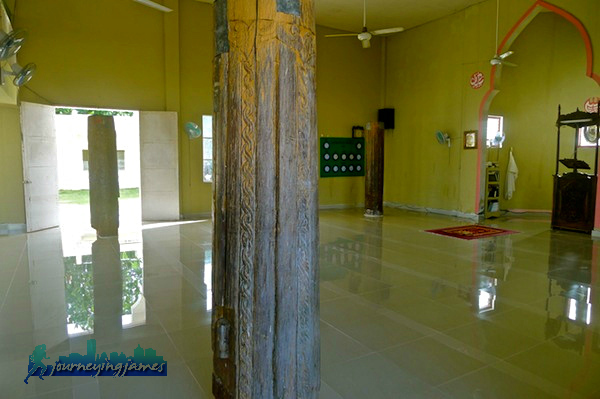Sheik Karim al Makdum Mosque found in Tubig Indangan, Simunul, Tawi-Tawi is the oldest mosque in the Philippines, declared a National Cultural Treasure and was visited by the late President Ferdinand Marcos himself in 1965 to install a historic marker on it’s wall.
The site of the Oldest Mosque in the Philippines- Masjid Sheik Makdum
Built by an Arab trader Sheik Makdum Karim himself on 1380. The original pillars of the old mosque can still be found inside the new building. According to the story, they tried to move or cut the foundation when they are renovating it but it can’t be moved or cut. The guide even pointed at the axe marks on the foundation. A photo on the wall outside displays the original Masjid (mosque) structure, square and is made of coconut-thatched roof, the four-foundations can be seen and there are lots of coconut trees behind it.
Notice the wood carving on one of the pillars.
The 4 Original Pillars of the Old Mosque
14th century Sheik Karimal Makdum Mosque
Present: Sheik Karim Al Makdum Mosque (2012)
I was able to visit the first and oldest mosque in the country when I was traveling in Tawi-Tawi. The site is sacred, historical and deserves a visit from all history-loving Filipinos. Imagine being there at the very site of where Islam started because a missionary from Arabia taught it while trading in the Philippines. I had goosebumps, can’t believe I am visiting the site I first saw on National Geographic.
Outside is an arch that proudly tells visitors of the famed heritage. I also saw some burial sites on the back of the mosque, you would notice the white cloth laid on the burial site.
I wonder how many Filipinos knew about this. I wonder if this is actually being taught in Hekasi or Elementary Philippine History. I love history before but I can’t remember this and I don’t took a lot of absences before. This brings me to the sad conclusion that our history is Manila-centric, and our Muslim heroes and Islam are mentioned only in passing.
Add to the belief of most Filipinos that Mindanao is scary, unsafe and full of terrorists. While I was in Tawi-Tawi I didn’t meet any accident, didn’t hear of any gunfire or bomb explosion. I ate breakfast with the locals in their local “kapehan” and walk downtown where everyone is smiling. You know what? I look like them but we have lots of differences- food we eat, clothes we wear, language we speak, religion we practice but we are under one nation- the Philippines, both lovers of peace and progress. I love this kind of diversity. How I pray that many would dare to visit this farthest province of the Philippines down south.
This brought me to study deeper about the history of Islam in the Philippines which brought me to some amazing facts I didn’t learn from school.
The Sultanate of Sulu. The Sultanate of Sulu founded in 1457, ruled much of Mindanao, Northern Borneo (we now call Sabah), the islands near it including Palawan. Do you know that until this time, Malaysia pays rent for Sabah to the Sultan of Sulu?
MINSUPALA. MinSuPala is an acronym for Mindanao, Sulu Peninsula and Palawan. So I’m guessing that during the pre-Hispanic Philippines we have Luzon, Visayas and MinSuPala regions.



















